News
Flood-hit villagers wait helplessly in watery desolation
The flash flood waters are receding but the victims who were displaced are left hungry and yearning for help. 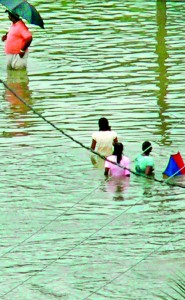
Her denim trousers hiked to her knees, Dushmanthi Siriwardena, 24, stands in the mud outside her house. Her baby, who will turn two this year, clings to her neck, unaware of the tears that roll down 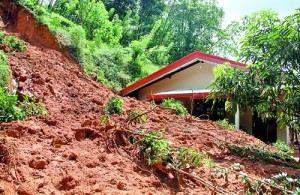 Dushmanthi’s cheeks as she gazes at what remains of her newly-completed house.
Dushmanthi’s cheeks as she gazes at what remains of her newly-completed house.
The torrential rains that fell for days this week caused floods and earthslips that killed 23 people, displaced thousands and damaged many houses around the country. Roads were blocked by water that lay stagnant for days, leaving villagers without access to food and medicine. Pregnant women, fathers carrying babies, the aged and children had to wade large distances through sometimes waist-deep water to obtain their basic needs.
Government aid and the Disaster Management Centres as well as the army failed to reach the affected in time, leaving many helpless and hungry. Villagers say that lives could have been saved if the relevant departments had worked promptly.
In Kalutara district, 13 of the 14 Local Government Areas were heavily affected by the flooding rains. Fourteen people were killed, more than 13,000 families displaced and nearly 300 houses damaged in the district.
Kirimatidola in Kithulgoda, which lies about 4.5km away from Agalawatta town, is a village situated on a hill. Most of the residents here live on daily wages. About 30 houses on the hill were destroyed by the heavy rains that fell for days. Dushmanthi’s house is among the damaged dwellings.

Agalawatte residents wade through flood waters. Pix by Indika Handuwala
“We completed the house less than three months back. We painted and furnished it as we could. My father, who is working abroad, gave everything he earned to build the house. Now we can’t live in it. Everything is gone with the water,” sobbed Dushmanthi.
On Sunday night (June 1) earth and rocks collapsed on her house. Dushmanthi and her sleeping family had a narrow escape. Today she and her family are living in a relative’s home in Matugama until they get back on their feet.
Several kilometers away from Dushmanthi’s house, 65-year-old K. Piyadasa lived with his wife, son and daughter-in-law. The same night an earthslip destroyed his house, burying the family under the debris. Villagers rescued them and rushed them to Matugama Hospital, where his wife is still receiving treatment.
Piyadasa, who had injuries to his head and legs, came back to take a look at the ruins of his home.
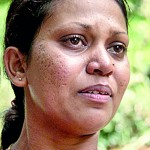
Dushmanthi Siriwardena and (above) what remains of her newly built house
“We are not rich people. This house is all we had. Now it is gone. I do not know or understand what to do with this life. We can’t start it all over again. We are too old,” lamented Piyadasa.
Even three days after the tragedy, government aid in any form failed to reach most of the affected people. Female government officers in neat sarees and heels visited the areas with cooked food and a list of names. They came to the foot of the hill in Kirimatidola and called out to passers-by and distributed rice parcels.
“These officers did not go beyond this bridge,” said W. Abeywardena, pointing to a bridge that was completely blocked by fallen trees and rocks. Abeywardena, who is also the secretary of the village Funeral Welfare Committee, said the officers would not approach the bridge but simply gave food to whoever was
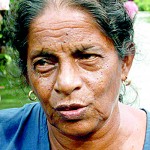
M. W. Perera
nearby and called it a day. The suffering people beyond the bridge got no help,
A temporary bridge had been made with two fallen trees.
“Can these female officers cross this bridge? There are many people up on the hill who don’t have water or food. Children are hungry and the villagers need aid. Government officials have to act in a practical way at times like these,” he said.
Beyond the bridge, people were trying to save what is left of their furniture, equipment and clothes bundled in sarees and bedsheets taken from their relative’s houses.
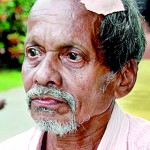
K. Piyadasa
Broken planks, plastic chairs and piles of mud are all that remain of Gamini Sarath Kumara’s mud-built house. Underneath lie what are left of the books that belonged to his two daughters aged 13 and 15. Gamini and his wife pluck tea for a living, usually earning about Rs. 600 each a day but since the rains they have not had work and are left without a cent.
“We did not get food or any sort of help. I went to the main road every morning after the floods in the hope of being able to talk to an official about my plight but no one came. We don’t have clothes or sheets to cover oueselves at night. My two girls cannot live under these conditions. We are helpless,” Gamini said as tears rolled down his cheeks.
In another part of the district, in Polwattagoda and Dammayawatta, several kilometres away from Agalawatta, five people including three children lost their lives. Villagers had to work for several hours until the Disaster Management Centre “managed” to work.
Forty-four-year-old Chandana Ruwan Thilaka was in Horana when he received a phone call from his sister saying that her house had been buried in a landslide and that her two children were missing, trapped underneath.
Chandana rushed to the site and with the help of other villagers and the meagre light of phone torches they pulled out the bodies of the two children.
“There was no electricity, no light and we did not have sufficient equipment to remove the earth and rocks. With phone torches and light from lightning strikes we kept on searching. It was after five hours of hard work that we finally found the two bodies,” he said.
The roads were completely blocked by floods from Dulwella to Veyangalla, Kudaligama and several other villages in the Agalawatta Division. Cooked food and medicines were carried to people in six boats, some privately owned.
Several kilometers away in Hedigalla, the Ratnapura-Kalawana road was also under water forcing people to walk through water. Aid did not reach the villages in this area. M.W. Perera (no first name?), 64, a mother of three, said she had to walk several kilometres to the main road and wait until people gave them food.
“We are very badly affected. Our houses are under water and now we have to wade through water to get aid. Why can’t they bring it to us instead? Is it very hard?” she asked.
Kalutara District Secretary U.D.C. Jayalal said cooked food and dry rations had been distributed to the affected on time.
“Now we don’t have a problem and the water is subsiding,” he said.
| Pitiful relics of two little lives
Four-year-old Rusiru Lakshan lay beside his sister. Next to him lay pair of black shoes, polished well, hardly worn. Placed beside his eight-year-old sister, Sanduni Nimeshika, was a new, full-skirted dress, yellow and white, fit for a special occasion. 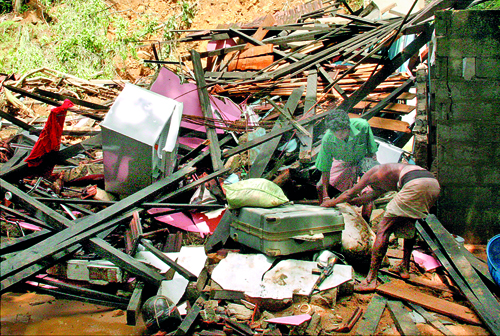 Two young lives were buried under this heap that was once their home Simple possessions, but they had kept the siblings excited for a week before the unexpected happened. They had been sleeping next to each other, just like this, in a room at the back of their house last Sunday night in the village of Polwattagoda, near Agalawatta. Rusiru had his pair of shoes by him. His father had bought them for an approaching wedding for which Rusiru was to be the page boy, and the child had been holding them tight every night as he went to sleep. “Sunday was a rainy day. I stayed with my children until my wife returned from the garment factory at which she worked. During the evening, I bought 500g of dhal from a shop down the hill and made dinner. I fed the little ones and they ate well. Then I put them to sleep,” explained Lal Karunathilake, 50. It was raining very heavily during the night. The thunder was deafening. Lal couldn’t sleep a wink. He drank two cups of tea and chewed betel as he stayed up. Around 11.35pm he heard an unusual sound. “I went out to see what it was. It was the earth collapsing. I shouted and turned to wake up my children and wife but it was too late. I was trapped under the earth and fallen walls. I screamed out for help but no one heard me,” he said. After nearly an hour of struggle, Lal managed to free himself from the debris and stagger, bleeding and covered in mud, to his mother’s house, some 40 feet away. Sixteen-year-old Janith Aloka who had been sleeping at his grandmother’s since he was little found his father on 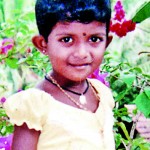 Sanduni the doorstep.  Rusiru “I hadn’t heard anything because it had been raining hard, until my father came for help. When we went together to our house it was still raining. The house was covered with earth and fallen rocks. It was very hard to look for anyone because there was no electricity and it was very dark. I heard my mother scream and pulled her out from underneath a fallen wall,” Janith said. A party of more than 100 people came to search for the two children who were trapped underneath. It was around 5 a.m .when they finally managed to pull them out. But it was too late. The children were dead before they were admitted to the Matugama hospital
Team to report on damaged schools A special team from the Western Province Education Department and its Ministry will be sent next week to make a report on schools damaged by the heavy rains, Western Province Education Director Wimal Gunaratne said. 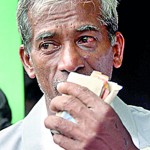 The grieving parents Classes in a number of areas in the country were disrupted as a result of the severe weather conditions. A large number of schools in the Western Province were under water and damaged by earthslips. The Education Director said that the team consisting of engineers would make note of damaged school property and buildings to ensure that they were safe for students to study in. He said that they the damaged schools would be repaired within the next few weeks. Up to 55 schools in the Horana area were inaccessible due to floods until Wednesday. In addition to this, the Kalutara district was severely affected by the prevailing rains and 32 schools in Matugama were also closed. Reports say that altogether 130 schools in the Western Province were not functioning throughout this week. “Though pupils could not attend school, teachers reported for work in these schools. Now conditions are improving and only a couple of schools remained crippled by Friday,” Mr. Gunaratne said. “The schools’ authorities will have to catch up on the missed days,” he added. “To do this we have decided to make a special timetable. |

